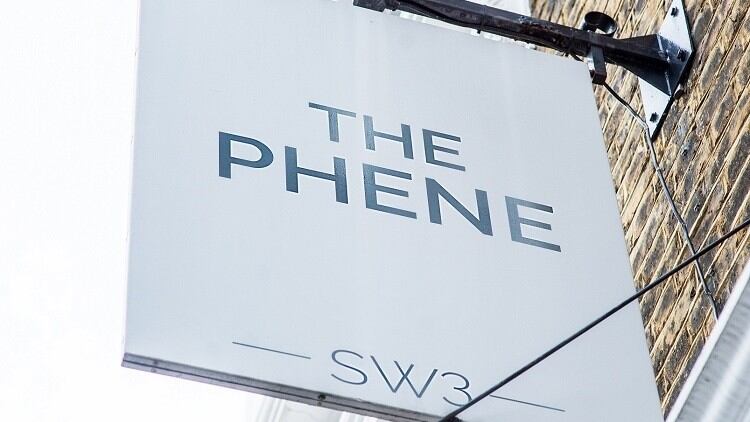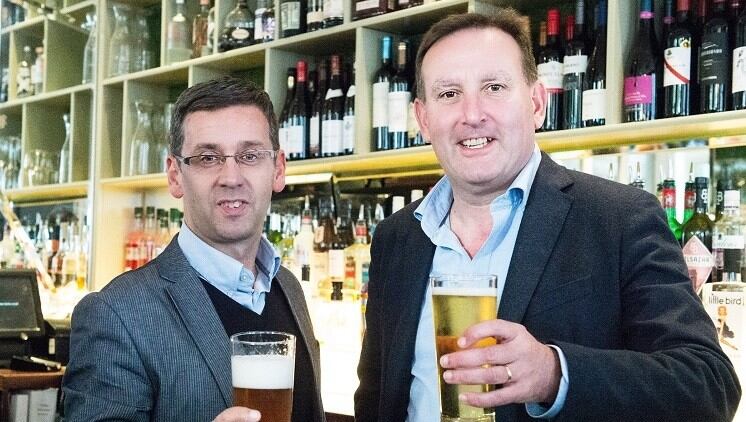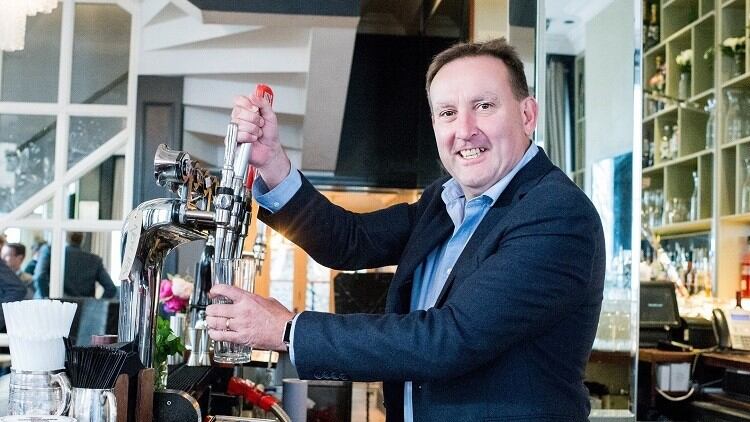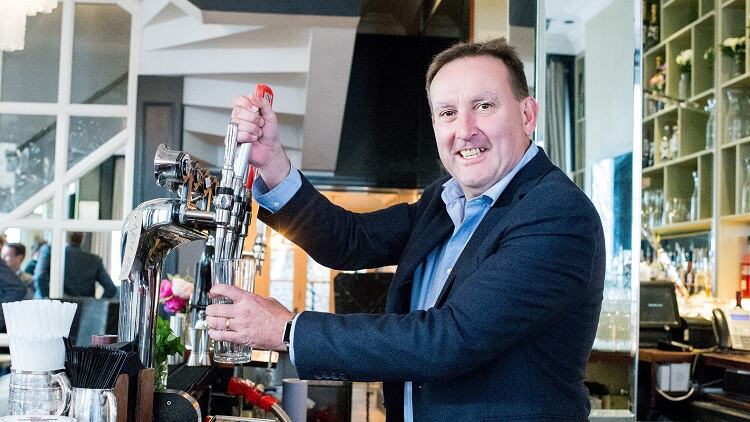Clive Watson is probably the sector’s most vocal Remain supporter, and has delivered stark warnings on this site about the derailing effect Brexit could have on the industry and the country.
However, over the past two years there has been absolutely no sign of Watson letting the spectre of Brexit get in the way of his vision of building a national estate of independent, managed pubs.
He stuck to his goal – first expressed before the referendum – of floating his company by the end of 2017 and now 12 months on the group has increased its pipeline for the next few years, confident that whatever happens in March, people are more likely than ever to need a drink.
City Pub Group is Watson’s third listed company – having been finance director when Regent Inns floated in 1993 and then taken Capital Pub Company public in 2007.
Despite almost a quarter of a century around the stock market, Watson has a horror of corporate thinking eroding operational know-how and remains at heart a true pub man.
“What I’ve always said to shareholders is that I will keep them updated and fulfil all my responsibilities but I’m not the type to be doing long lunches in the City”, he says.
We meet at City Pub Group’s latest opening – the Brighton Beach Club – to discuss a year since the IPO, during which period it has grown to 45 sites, with an ambition to get to 75-85 by the middle of 2021.
He says: “There were people who didn’t think we’d get the float away but we stuck to our guns. It actually went very smoothly and it was a good result for everyone – the shareholders who wanted to come out got a good exit but a lot stayed in. We raised £35m and then another £6m this year and that has given us the financial security to build a proper pubco.
“Really, that’s the end of that particular part of the journey and now we need to keep the momentum going. And that is where the hard work really starts.
“Growing pains are what keeps me up at night – it’s one of the biggest challenges for a company at our stage. We have an entrepreneurial attitude and we started from a base of zero six years ago. We need to retain that spirit and not get caught in the corporate haze but at the same time you have to make sure some things are uniform across the business.”

Growing pub by pub
The strategy for growing City Pub Group has always centred around individual acquisitions, building up a hub of independent businesses in each city as it grows. Historically the company was split into East and West, with managing directors Rupert Clark and Alex Derrick heading up their respective divisions. Both are now joint managing directors but the geographic divide has remained broadly the same.
The aim is to have at least four pubs in each of the hubs, although in Cambridge there are already eight.
Watson says: “Eight is probably as far as we can go in one city and it wouldn’t be right for every one. But, in Brighton or in Cardiff (where the group has just secured its second site – the Chapel Bar & Restaurant in Churchill Way) I don’t see any reason why we couldn’t get to that level. We would never do it for the sake of it but if the right sites are available, why not?
“We can take that approach because we’re not a brand and we don’t have a template that we roll out into every pub. These are individual pubs with their own offers and while there’s underlying service standards and quality across the group, you wouldn’t necessarily know that all our pubs were part of the same group.
“The hubs are an important tool in terms of staffing. It creates opportunities for internal promotion and builds local expertise.”
On the criteria for selecting cities, Watson says: “I’ve always said that I only want to have pubs in cities where I personally want to go. I love Brighton, Exeter, Norwich. I never think I’m going there to visit a pub out of duty and I don’t want that to change.
“If you look at the places where we’re represented, cathedrals are pretty abundant but that alone isn’t enough for us to pick a location. It ideally has to have a university, some tourist trade –a mixture of clientele.
“At some point we will have to think about whether we move our geographic boundaries north slightly but at this stage there’s no shortage of opportunities to infill.”

Family firm
As the group approaches the 50-mark it continues to benefit from its close ties with Mosaic Pub Company, the now 14-strong operator. Mosaic, run by Watson’s brother, James, operates similarly independent pubs but has a clear divide in terms of the geography for acquisitions. While London is fair game for both, Mosaic has focussed on the Midlands and Kent for its burgeoning estate. Despite Watson Snr’s involvement in setting up Mosaic (as City Pub EIS Fund) the two companies are now completely separate entities, although join forces to boost purchasing power.
Mosaic has inevitably been mooted as a potential acquisition for City Pub Group at some point but Watson insists that for now there is no plan to change the strategy of growing pub by pub.
He says: “Individual pub deals have done us well. We have an ambition to grow the estate but there’s no dash to growth. We don’t want to be on that treadmill. It has to be controlled expansion.
“Part of our success is that we are not looking to buy someone else’s corporate success story. We don’t mind buying individual success stories though.”
Outside of the growing pains, Watson stresses that the key challenge for City Pub Group, and the sector, is recruitment and retention.
City Pub Group has been an enthusiastic supporter of employee representation at board meetings and championed profit share schemes for all employees. He says the board is currently considering a “pretty radical” evolution of that offer.
He says: “If you’re treated like a number, that’s how you’ll act. Everything we’ve done is about making sure people feel valued and that they are sharing in the success of the company.
“I believe that if you are inclusive and that people are allowed to have fun you will be an attractive employer. Pubs do have a hill to climb in that respect because of the unsociable hours but we have to ensure we are really shouting about what we can offer people.”
The people on the other side of the bar are equally as important, of course, and Watson insists that City Pub Group is creating venues that are attractive to all.
“What I’m proud of is that if you go into our pubs you will see students, you will see tourists and office workers but no one would call them student pubs or accuse them of being just for tourists.
“What we are starting to return to – and this goes back to the Regent Inn days – is zoning, because millennials aren’t always the best mixers.”

Generation gap
Millennials and their even trickier counterparts in Generation Z remain a challenge to pub operators, one that Watson is keenly aware of and is influencing a shift in the sales mix within the company.
He says: “The delivery scene has really gone to a new level and it’s because this generation has grown up with it. I see it with my children – they don’t go to a shop to buy shoes, they get them online and if they’re the wrong size they simply pop them back in the post and get another pair.
“It’s the same with food, they’ll order the tiniest things to be delivered and don’t even think about.
“That’s having an impact on what we do because whereas 10 years ago food was often the key to bringing people out of the house, now young people are ordering their dinner for delivery and going out for a few drinks.”
This younger audience has been driving the trend towards vegan and vegetarian options and City Pub Group has gone further than most in this regard. In May, Watson teamed up with his daughters - Made in Chelsea stars, Lucy and Tiffany – to open Tell Your Friends, a dedicated vegan pub in Parsons Green.
The lessons have been instrumental – food sales have been strong but Watson is only slightly exaggerating when he says “it’s difficult to convince them to drink anything beyond water”. He admits that the choice of a former Strada site in New King’s Road has not been ideal both in terms of generating daytime trade or in having a ready source of meat-shy millennials.
However, it has proved a valuable test bed for vegan offers in the wider estate and Watson says he is keen to do another in an “edgier” location. The brand is also likely to spearhead City Pub Group’s first foray into delivery, with discussions currently underway.
The changing attitudes to the pub leads Watson to believe that wet-led is once again king. The sales mix at City Pub Group has already fallen from c30% food to closer to 25% and Watson does not see this trend changing imminently.
Other areas where City Pub Group is targeting sales growth include accommodation, which Watson expects to make up 5% of sales within the next two years.
All things considered Watson is confident about the future prospects for the Great British Pub (with the constant caveat that is Brexit – a topic we discussed at length but which was out of date by the very next day, let alone at the time of publishing).
He says: “Trade is fine. It’s not gangbusters but it’s fine. And, I don’t think that’s a reason to be downbeat – I don’t think it’s a bad place to be at all. A lot of other retail companies would kill for the sort of growth we are seeing. We have to remember that and we have to remember why that is. We offer value for money and a place to bring people together.
"That last point is really important because those places are shrinking. People don’t shop, they don’t go to church, there aren’t the community facilities that there once were but there is still the pub.”
This interview was first published on The Morning Advertiser's sister title MCA Insight.


